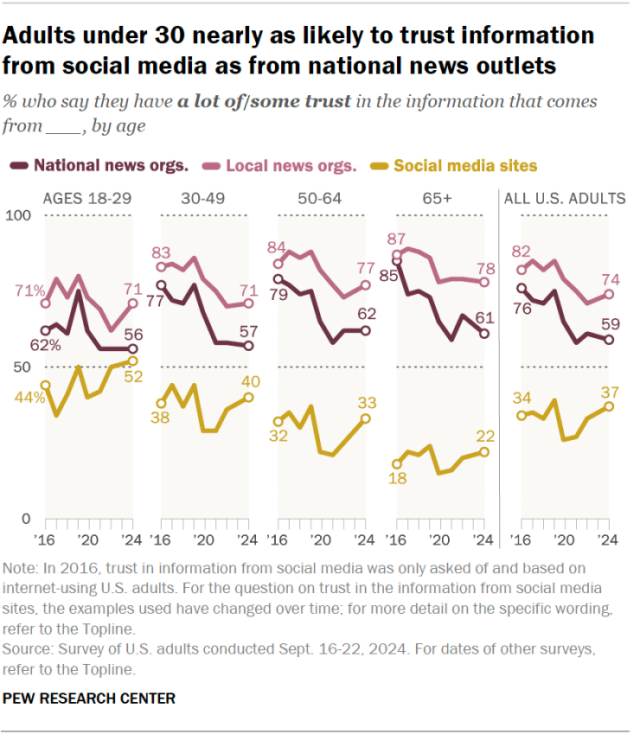☀️ Happy Thursday! The Briefing is your guide to the world of news and information. Sign up here!
In today’s email:
- Featured story: Trump pushes back against fact-checking
- New from Pew Research Center: Republicans, young adults now nearly as likely to trust info from social media as from national news outlets
- In other news: Harris interviews with Fox News
- Looking ahead: Record number of AP staff to work election night
- Chart of the week: Levels of trust in information from social media, news organizations vary by age
🔥 Top story
As the presidential election draws closer, Donald Trump has been pushing back against fact-checking in interviews and debates. CBS said that Trump declined an interview on 60 Minutes in part because he objected to the show’s fact-checking practice. And the Trump campaign reportedly complained about the fact-checking that occurred during his September debate with Kamala Harris.
During the previous presidential election cycle, we measured sharp partisan differences in views of fact checking. When asked about fact-checking efforts by news outlets and other organizations in a 2019 Center survey, seven-in-ten Republicans said fact-checkers tend to favor one side, while roughly three-in-ten Democrats (29%) expressed this view. Most Democrats (69%) instead said that fact-checking efforts generally deal fairly with all sides.
🚨 New from Pew Research Center
Republicans have long been less trusting than Democrats of national news organizations. Today, they are nearly as likely to trust the information that comes from social media sites as they are to trust information from national news outlets. The same pattern appears among young adults.
Read more about trends in Americans’ trust in information from national news organizations, local news organizations and social media since 2016.
📌 In other news
- Kamala Harris interviews with Fox News
- Supreme Court allows lawsuit filed by Texas online journalist over arrest
- Gateway Pundit acknowledges Georgia election workers cleared after defamation settlement
- Las Vegas politician convicted of killing journalist is sentenced to life in prison
- Taliban bans images of living beings on Afghan media
- Head of diversity at Condé Nast stepped down following disputes about the Israel-Hamas war
- Australia’s age-based social media ban raises fears of isolation
- Midwestern nonprofit shuts its Wichita newsroom
📅 Looking ahead
The Associated Press told Axios this week that the organization will have more than 5,000 people working on election night, a higher number than ever before. News organizations around the world use AP’s data and race calls as key elements of their election coverage.
Americans tuned in closely to election results during the last presidential race. Roughly nine-in-ten U.S. adults said they checked in on the results on Election Day 2020 at least occasionally, according to a Pew Research Center survey from that year. This includes seven-in-ten who followed the returns almost constantly (36%) or fairly often (34%).
Most also said that the sources they turned to after polls closed did very well (38%) or somewhat well (40%) in helping them understand the results.
📊 Chart of the week
This week’s chart looks at age patterns in Americans’ trust in information from news organizations and social media. In a new Center survey, adults under 30 are now nearly as likely to have at least some trust in the information that comes from social media sites (52%) as from national news organizations (56%). For all other age groups, trust in information from social media sites remains lower than trust in both local and national news organizations.

👋 That’s all for this week.
The Briefing is compiled by Pew Research Center staff, including Naomi Forman-Katz, Jacob Liedke, Sarah Naseer, Christopher St. Aubin, Luxuan Wang and Emily Tomasik. It is edited by Michael Lipka and copy edited by Anna Jackson.
Do you like this newsletter? Email us at journalism@pewresearch.org or fill out this two-question survey to tell us what you think.